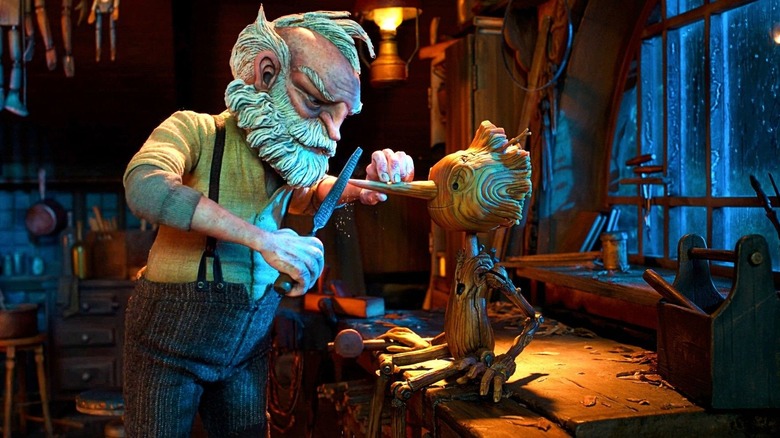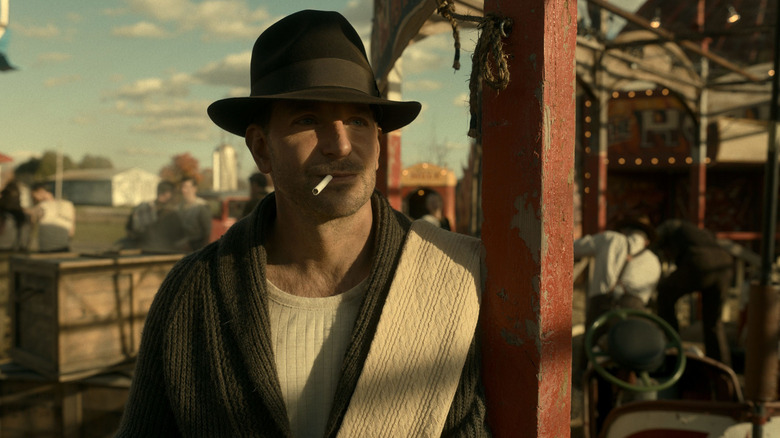Guillermo Del Toro's Frankenstein Shares A Common Theme With Nightmare Alley And Pinocchio
Guillermo del Toro has worked on a lot of projects (and I mean a lot) that have never been made. Because of this, he seems to have adopted a handy waste not, want not approach to directing. For example, when his "Haunted Mansion" film fell apart, he channeled those energies into his sumptuous haunted house flick, "Crimson Peak." Then, when his plans to remake "Beauty and the Beast" and "Creature from the Black Lagoon" fell through, he basically merged the two films to create his Oscar-winning girl-meets-fishboy romance, "The Shape of Water." In fact, I'd go so far as to argue that what del Toro actually directs is usually better than what he originally had in mind.
That bodes well for his next film, "Frankenstein." A new take on Mary Shelley's Gothic sci-fi/horror masterpiece has been one of del Toro's white whales for a very long time. At one point, his plan was to helm the film as part of Universal's monster movie franchise, although the whole Dark Universe debacle might have put the kibosh on that notion. He's since retooled the film for Netflix following their collaboration on the stop-motion "Pinocchio," with Andrew Garfield, Oscar Isaac, and Mia Goth loosely attached to star. According to his longtime producer, J. Miles Dale, pitching its tent at one of the shadier companies of the Alliance of Motion Picture and Television Producers (AMPTP) isn't the only thing that links these two del Toro pictures.
Guillermo del Toro's dad movie trilogy
"Frankenstein" is about a lot of things but the core of the story is the relationship between the scientist Victor Frankenstein and the creature he brings to life using science. It's a story about a father and their child, in other words, which is a motif that's shown up in Guillermo del Toro's last two films, "Nightmare Alley" and "Pinocchio." Speaking to A. Frame, J. Miles Dale said this was partially inspired by the deaths of his and del Toro's own fathers and that "Frankenstein" forms a thematic trilogy with the two films:
"In the last couple of films, certainly with 'Nightmare Alley' and then with 'Pinocchio,' we've dealt with the whole father-son relationship. And Guillermo and I both lost our fathers in the last few years. When you have a strong father figure, it's a big part of our lives. This version of 'Frankenstein' very much goes down that thematic road. So, I feel like this is the third film in Guillermo's father trilogy. That's exciting, and when you read the script, it's very emotional and, of course, very iconic."
The relationships between Stan Carlisle and his father in "Nightmare Alley" and between Geppetto and Pinocchio are worlds apart yet tap into related ideas about the ways sons serve as mirrors for their fathers, much like "Frankenstein" does. In fact, del Toro's whole father-child motif goes back much further than those films, with Trevor Bruttenholm in "Hellboy" and Stacker Pentecost in "Pacific Rim" serving as adopted fathers to the characters Hellboy and Mako Mori, respectively. With "Pinocchio," del Toro even wove imagery and themes lifted directly from Mary Shelley's novel into the fabric of his anti-fascist fable. Suffice it to say, I'm curious to see how he goes about bringing this fixation of his to the surface in "Frankenstein."

